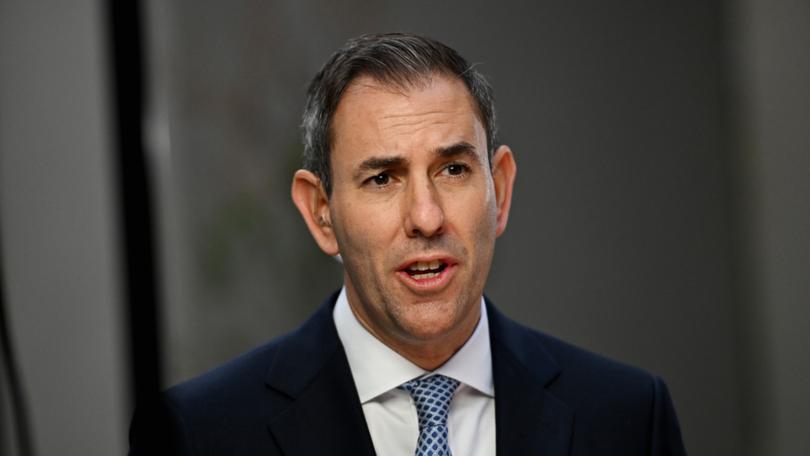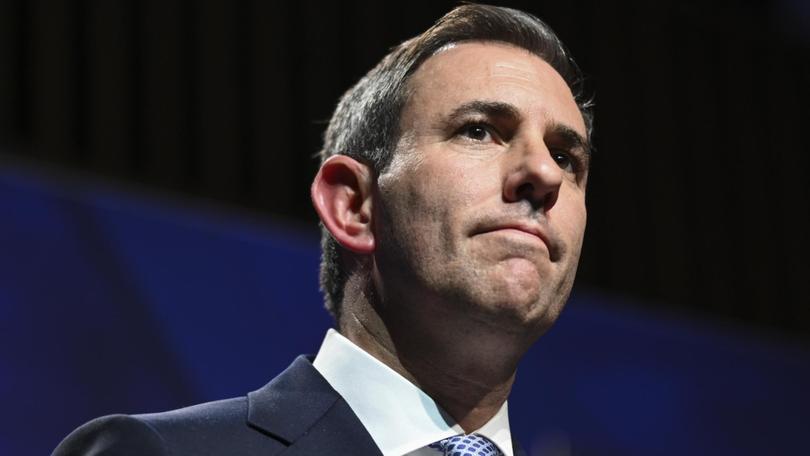PAUL MURRAY: Jim Chalmers had three chances to repair our accounts
Jim Chalmers has had three set-piece opportunities to repair the national accounts — and he’s come up short every time.

Jim Chalmers has had three set-piece opportunities to repair the national accounts — and he’s come up short every time.
Having fluffed his first two chances through a lack of fiscal discipline, his latest Budget delivers massive deficits rolling out for the rest of the decade as he kicks structural economic reform down the road in favour of pre-election handouts.
Rarely has a Budget been so severely savaged by credible commentators — economic, financial and political — as this week’s lame offering.
Sign up to The Nightly's newsletters.
Get the first look at the digital newspaper, curated daily stories and breaking headlines delivered to your inbox.
By continuing you agree to our Terms and Privacy Policy.It was so bad that Opposition Leader Peter Dutton hardly bothered with the detail in his official reply on Thursday, instead delivering an election pitch offering back-to-basics government and attacking Labor’s misguided priorities.
The last Budget to get such hostile treatment was Joe Hockey’s in 2014. That was for an excess of the spending restraint that Chalmers finds so hard to muster.
But first, a slight diversion.
Chalmers is not the only Treasurer who is fuelling inflation with a Budget that professes to be responsible while simultaneously racking up generational debt.
Rita Saffioti should not be let off the hook. Like Chalmers, she has had the benefit of booming mining-based revenues — hers through royalties and his through corporate taxes — but spends as if inflation is for others to fix.
If Saffioti’s recent Budget was framed under the same accounting rules as Chalmers’, she wouldn’t look so smug. As I alluded to in my State Budget comment, Saffioti’s claimed surplus for the coming financial year is palpable nonsense — even if ostensibly right.
How can you claim a surplus in a Budget that records a bigger rise in overall debt?
The truth is that under the Federal standard, Saffioti’s Budget would have a deficit of $3.618 billion for the 24-25 year, not a surplus of $2.603b.
That’s when measured as a total public sector cash balance. It’s all buried in the Budget’s fine print.
WA Treasurers always prefer to quote the “general government sector net operating balance” — which gives an incomplete picture.
Saffioti’s claimed surplus for 24-25, and similar figures for the three out-years, is a few line items above the Budget’s successive “total public sector” cash deficits for those forward periods of $3.891b, $2.508b and $730m.
You could think of it as the Metronet effect. Keep shovelling in the cash and watch the debt mountain grow.
Moving on. Even the usually left-leaning Australian Financial Review headlined its Federal Budget coverage on Wednesday with “Spending addiction fuels a new decade of deficits”.
American economics professor Steven Hamilton, visiting fellows at the Australian National University in Canberra, went even further: “The most irresponsible Budget in recent memory,” he wrote in the AFR.
“The Government set itself a simple standard: not to make the Reserve Bank’s job harder. Michele Bullock (the RBA governor) may just choke on her cornflakes.”
Respected economist and former Treasury official Chris Richardson: “My big ask of the Budget was that it didn’t poke the inflationary bear. I don’t think it passed that test.”
Remind me not to go for a drive with Chalmers any time soon because he clearly doesn’t understand the difference between the accelerator and the brake.
And there’s another side to a hallmark of this Budget that also calls into question Chalmers’ economic nous against his political chicanery.
Subsidising energy bills by $75 a quarter doesn’t have the immediate negative inflationary impact he would like punters to believe. It merely postpones the uptick until consumers must face the full cost themselves again.

And the real cost of electricity is what the Prime Minister vowed to lower by $275 a year when buying his way into office.
“Cheaper” renewables were going to do it. So forget about their pleadings the Ukraine War wrecked his undertaking by pushing up fossil fuel prices.
It’s a broken promise that Albanese is buying back with our own money.
Yes, you are effectively filling the $275 pledge with $300 from your taxes.
And again, Albanese thinks it’s a vote-winner. Is he playing us for fools?
When the last $75 handout is paid, won’t power bills still be more than $275 higher than he promised?
The role of government should be to manage the economy, not subsidise it. A properly-functioning government ensures the settings are right, avoiding the need to borrow against the nation’s future to paper over policy failures.
Tony Abbott paid a high political price for Joe Hockey’s tough 2014 Budget, mainly because it was not what he had promised coming to power, but also because it marked the start of the era when Australians showed they were no longer willing to tighten their belts in the national interest.
However, that Budget was largely based on the work of a post-election Commission of Audit which came up with a blueprint for reforming national government spending.
The Budget also included the results of the Lewis efficiency review of the ABC, ordered by a communications minister called Malcolm Turnbull, which set the framework for one per cent cuts in funding to the national broadcaster for each of four following years.
It was the latter cuts, rather than the former, that really sent the luvvies into paroxysms of rage. Since then, successive governments have pandered to uneconomically soft sentiments, unwilling to present hard options to a society used to decades of the good life.
In 2016, Abbott was still licking his wounds after being dumped as Prime Minister, ironically in favour of the duplicitous Turnbull, who became an ABC icon but maintained he had done the right thing:
“I’m happy to stand behind the 2014 Budget,” Abbott said in a radio interview. “It was obviously a Budget that was sabotaged in the Senate, but it was a Budget of sustained structural reform.
“Had those measures passed through the Senate, our budgetary position would be vastly better, our future I think would be much more secure because we would be living within our means.”
Which we definitely aren’t doing for the rest of this decade, thanks to Chalmers.
Chalmers punts that cost-of-living handouts — undisguised election bribes because they are not means-tested, ensuring the widest possible distribution of the cash — will keep Labor in power.
As this column noted last Saturday, looming elections wreck Budget discipline because political self-preservation becomes the dominant element.
Unfortunately, Chalmers is in denial about his failure to prepare a contractionary Budget for the times, rather than a traditionally big-spending Labor-centric, pre-election gambit.
Home-grown inflation is partly of his making, as columnist Mark Riley pointed to on Friday.
Chalmers punts that cost-of-living handouts — undisguised election bribes because they are not means-tested, ensuring the widest possible distribution of the cash — will keep Labor in power.
If they were honestly to help people in hardship, they would be targeted, potentially allowing even higher individual payments from the same pool. That would also ensure the money wasn’t squandered by the wealthy.
The idea that means-testing is somehow bureaucratically difficult or adds to the cost of delivery is not only demonstrably wrong, but in this context dishonest. Canberra runs the tax and welfare systems and knows who earns what.
The only difficulty is political. Many of those who miss out don’t like it.
In Treasury’s Budget outlook statement, under the heading of “responsible economic management” this startling paragraph appears:
“The Government is directly reducing inflation through responsible cost-of-living measures. In 2024–25, these measures are estimated to directly reduce inflation by ½ of a percentage point and are not expected to add to broader inflationary pressures.”
Not one credible economist commenting on the Budget agrees with that assessment. None.
While such spending might temporarily depress some inflation metrics, they are not the ones on which the RBA makes its decisions anyway. No one is fooled.
Chalmers is trying to intimidate the RBA not to lift interest rates this year — even though it discussed doing just that at its last meeting, while not considering a cut — but this Budget has ensured there will be no mortgage relief before Christmas.
Which is what many households have been demanding.
Any Budget which has one simple assertion as its centrepiece — an expressed ambition to fight inflation — that has economists lining up to repudiate it, should surely be declared dead on arrival.
The Opposition could hardly have hoped for a better gift with the prospects for an early election against a government in retreat. That’s possible from August 7.
Dutton’s response was poorly-written, nervously-delivered, lacking light and shade or clever media hooks. He will need to do better in the campaign.
The coalition intends to focus on Albanese’s destructive tidal wave of immigration. It has the rudiments of a strong housing policy, a key battleground.
Dutton stung with the line that Albanese’s Future Made In Australia policy has no chance under Chris Bowen’s high energy prices and the reliance on unreliable renewable power sources.
Labor thinks it owns the health portfolio. Dutton’s confident recounting of his record on bulk-billing rates as a health minister against theirs had those opposite squirming.
Chalmers delivered a pre-election Budget. And it’s one Labor will regret.
